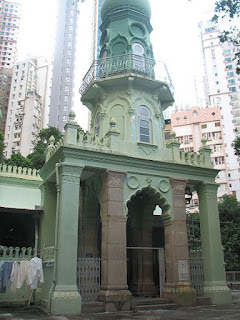Islam is practised in Hong Kong by about 300,000 Muslims.[1][2] About 20,000[3] of the Muslim families in Hong Kong are 'local boy' families, Muslims of mixed Chinese and South Asian ancestry descended from early Muslim South Asian immigrants who took local Chinese wives and brought their children up as Muslims.[4][5] Hui Muslims from Mainland China also played a role in the development of Islam in Hong Kong, such as Kasim Tuet from Guangzhou, one of the pioneers of Muslim education in the city, for who the Islamic Kasim Tuet Memorial College is named.[6] In the new millennium, the largest number of Muslims in the territory are Indonesian, in which most of them are female foreign domestic workers. They account for over 120,000 of Hong Kong's Muslim population.[7] The vast majority of Muslims in Hong Kong are Sunni.
History
The history of Muslims in Hong Kong started since the British Hong Kong government period. The first Muslim settlers in Hong Kong were of Indian origin, in which some of them were soldiers. From the mid 19th century onwards, more and more soldiers and businessmen arrived in Hong Kong from South Asia and Mainland China. As the number of them increased, the British Hong Kong government allocated land for them to build their communities and facilities, such as mosques and cemeteries. The British government respected the rights of those Muslim communities by giving them aid. [9][10]
Chinese Muslims first arrived in Hong Kong in the late 19th and early 20th century, coming from southern Chinese coastal areas, where they had lived for centuries prior. They established their community around Wan Chai District (location of the Wan Chai Mosque). Later Chinese Muslim influxes occurred following episodes of unrest on the mainland.[11] Some Chinese are also more recent converts to Islam.[12] As of 2004, the Chinese Muslims account for over 50% of the Muslim resident population of Hong Kong, and they play an important role in the Islamic organisations of Hong Kong.
Contemporary Islam in Hong Kong
Food
Over the past few years, there has been an increasing number of Halal restaurants to cater for Muslim dietary needs, as well as supermarkets selling more and more Halal products. In 2010, there were only 14 Halal restaurants, but after a year the number had jumped three times.[13]
Finance
There has been a plan by HSBC to implement the Islamic finance system in Hong Kong, although the realisation has yet to be waited. In 2007, the HK Islamic Index was established by Arab Chamber of Commerce and Industry in Hong Kong to support Hong Kong's ambitions to develop into an Islamic financial centre. In the same year, Financial Secretary John Tsang announced a plan to capture part of the world's Islamic finance pie, which is worth around US$1.3 trillion. Hang Seng Bank has issued a retail Islamic fund in November 2007.[14]
Education
Until January 2010, Hong Kong has 29 Islamic schools, scattered around Kowloon and New Territories. The development of those schools have been remarkably fast.[15]
Some of the Islamic educational institutes:
- Hong Kong Institute of Islamic Studies
- Islamic Kasim Tuet Memorial College
Social challenges
Due to the limited lunch break time on Friday for working-class people in Hong Kong, Friday prayers are often held in a relatively short time. Muslims may also find difficulties in finding suitable place to pray at work or in school. Due to the absence of mosques in New Territories, Muslims living there may find it hard to go to Hong Kong's current six mosques due to their location in Kowloon or Hong Kong Island. Some of them rent flats and turn them into prayer rooms to serve Muslims living around the area. There are currently eight flats in Hong Kong being turned into prayer rooms
Mosques
There are currently six principal mosques in Hong Kong that are used daily for prayers. Hong Kong's 7th mosque, the Sheung Shui Mosque is currently under construction in New Territories.[9] Beside mosques, there are many Muslim prayer halls scattered around Hong Kong.
Jamia Mosque
The oldest is the Jamia Mosque on Hong Kong Island, which was built in the 1840s and rebuilt in 1915. The first Imam was Al Haaj Abul Habib Syed Mohammed Noor Shah, from 1914 to 1946.
Kowloon Mosque
The Kowloon Mosque in Nathan Road, opened in 1984, can accommodate about 3,500 worshipers. It is the largest mosque in Hong Kong.
Ammar Mosque
The Ammar Mosque at Oi Kwan Road in Wan Chai was opened in September 1981 and can accommodate a congregation of 700 to 1,500 people, depending on the requirements.
Chai Wan Mosque
Chai Wan Mosque is located at the Cape Collinson Muslim Cemetery.
Stanley Mosque
Stanley Mosque is located in the Stanley Prison.
Ibrahim Mosque
Ibrahim Mosque is located in the Yau Ma Tei was opened in November 2013
People
Maulana Qari Muhammad Tayaib Qasmi is an Islamic scholar who has lived in Hong Kong since 1989. He served as a Chief Imam and Khatib of Kowloon Mosque. He is currently running seven large Islamic Centres throughout Hong Kong, under the name of Khatme Nubuwwat Islamic Council, giving free after-school Quranic education to over 1,500 students, including adult students and young boys and girls, who study full-time in local schools in Hong Kong.



No comments:
Post a Comment